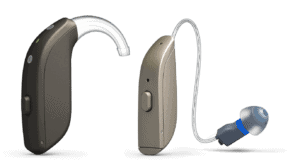Frequently Asked Questions About Hearing Health, Hearing Loss & Hearing Aids
Our Doctors of Audiology Are Here to Help
We have assembled answers to the most common questions people have asked us throughout our 43 years of helping patients with hearing health.

How do I know if I have a hearing loss?
Hearing loss often occurs so gradually that you may not be aware of a problem. In fact, it is not uncommon for a hearing loss to be first noticed by a family member, who has to speak louder or repeat herself. Early signs of hearing loss include:
- Turning the TV or radio volume louder than other family members prefer.
- Difficulty understanding speech in a background of noise, for instance in restaurants.
- More difficulty hearing children and women than men.
- Difficulty hearing in meetings.
- Difficulty hearing at public speaking events.
- Ringing in the ear(s) when no external sound is present.
- Having things repeated frequently.
- Difficulty hearing people “with low voices.”
If I suspect I have a hearing loss, what should I do?
If you suspect that you have a hearing loss, call us. As trained hearing professionals, we can identify whether your possible hearing loss requires medical or non-medical treatment and will refer you to the appropriate medical specialist when necessary. We will work with you to identify, diagnose, treat and manage your hearing loss.
What can I expect from a hearing evaluation?
History
We will perform a thorough assessment of your ears and what you can and cannot hear. We will start with a history interview. History questions will focus on the following areas:
- Conditions at birth or during adolescence that may have an impact on hearing.
- Exposure to workplace, military, or recreational noise.
- Medications prescribed for medical conditions.
- Past surgeries.
- Family traits and hereditary anomalies that may be associated with hearing loss.
Visual Inspection of Outer Ear and Ear Drum
Following the history, we will examine your outer ear with an otoscope or video otoscope. We can observe any damage caused by the use of cotton applicators (“Q-tips”), trauma, or chronic infection. We can also observe the condition of your ear drum and determine whether your ear canal may have a buildup of earwax causing a hearing loss.
Audiologicial Evaluation
After considering your history and performing a visual inspection of your outer ear, we will perform an hearing evaluation composed of a series of tests. These tests may include but are not limited to:
- Tympanometry to assess the status of the middle ear.
- Pure tone thresholds by air conduction and often by bone conduction to determine the degree and type of hearing loss.
- Tests of speech threshold and speech recognition to asses comprehension of complex signals.
- Special tests of auditory function, such as otoacoustic emissions, brainstem auditory evoked response (BAER), or balance testing.
How do I know if I need a hearing aid(s)?
Hearing Evaluation
The results of your hearing evaluation are a critical factor in helping to determine your need for hearing aid(s), the type of hearing aid(s) and whether one or two aids are needed. We will review the results of your evaluation and provide various options and recommendations.
Personal Preference, Lifestyle and Physical Health
Although the hearing evaluation is necessary to determine a course of action, it does not tell the entire story. Audiologists also consider and weigh your personal preferences as well as your overall health and your lifestyle. All of these things factor into the best solution for your type and degree of hearing loss.
What kinds of hearing aids are available?
Hearing aids are available in a variety of sizes and shapes, from instruments that fit behind the ear to instruments that totally fit within the ear canal and are minimally visible. Electronic circuitry has advanced significantly in the recent past, allowing patients greater sound comfort and improved speech recognition in noisy situations, among other benefits. Digital hearing aids, which are adjusted via a computer connection, provide the most flexibility. This allows us to custom fit the response of the device to a specific hearing loss. Digital hearing aids can be modified if hearing changes or as your listening needs change. We will work together with you to help you choose the best instrument for your listening needs, lifestyle and budget. Click here for more information on hearing aids.
Why do hearing aids cost so much?
Research and Development
R&D is needed continually to improve the technology that powers your hearing aid. This is a large percentage of the hearing instrument cost. Hundreds of millions of dollars are spent every year so the hearing industry can bring you smaller hearing aids that are more powerful and more natural sounding. This R&D process involves electrical engineers, audiologists, computer engineers, sound engineers, programmers and more.
High Tech/Low Volume
Hearing aids are sold in relatively low volume when compared with other electronic devices. For example, approximately 2 million hearing aids are sold in the U.S. per year as compared to 143 million cellphones. That’s less than 1% of the US population buying hearing aids each year. When you combine the high cost of developing hearing aids with the small market, prices are naturally going to be high.
Return for Credit Policy
“Return for Credit” policies are standard among hearing aid manufacturers and required by state and federal hearing aid guidelines, allowing new hearing aids to be returned within an established evaluation period. The costs associated with these policies are considerable, especially for custom products, and naturally must be absorbed in the overall pricing structure.
Professional Services and Overhead
Hearing aids should be fit by a professionally trained audiologist or hearing aid specialist in order to receive the proper benefit from the instruments. These healthcare providers will spend 3-6 hours on each patient for the hearing exam, evaluation, fitting (programing) of the hearing aids. There is also the cost of maintaining an office, staff, advertising, etc. While some of this is paid for by the exam fees, more often than not, providers include the cost of their time and services into the price of the hearing instruments.
“Cheap Hearing Aids” by Mail Order or Through Online Stores
Many low-priced products available on the internet or via mail order being marketed as ‘hearing aids’ are actually ‘sound amplifiers’. They do only that–amplify sound, just like turning up the volume on your TV.
‘Hearing aids’, on the other hand, are classified by the FDA as medical devices, and they compensate for hearing loss by processing sounds and delivering the modulated sounds to your ears based on your audiogram, which is the result of your hearing test and shows how each of your ears hears sounds in a variety of sound frequencies.
People with a hearing loss are often tempted by the low price and easy access of ‘cheap hearing aids’ available on the internet. Most offerings are off-the-shelf, one-size-fits-all items with limited, if any, programming options or features. Some are relabeled, discontinued overstock the origin of which is anyone’s guess. If you do see a brand name in the mix, it is usually a refurbished and/or discontinued device offered without the consent of the manufacturer.
The low price and easy access may be appealing but be aware that not only will your purchase come with limited support and an insufficient warranty (some are only 90 days), it may also damage your hearing. Misapplied frequencies and over-amplification from an improperly programmed hearing aid can cause permanent damage to your hearing as can the loud noises found emitted by low-end hearing aids.
Hearing aids are FDA regulated; reputable hearing aid manufacturers limit distribution of their hearing instruments; and hearing care professionals are required to be licensed in nearly every state for a very good reason: your hearing health.
If price is keeping you from talking to a hearing care professional about a hearing problem–or making you consider buying an inadequate, potentially damaging hearing aid or ‘sound amplifier’ on the internet it does not have to keep you from making an appointment for a hearing exam.
What can I expect as I adjust to my new hearing aids?
Besides helping you to hear and understand voices better, properly fitted and adjusted hearing aids will allow you to hear sounds that you may not have heard for years. The sound of wrinkling newspaper, running water, even your own voice, may be strange at first. However, after about 2-3 weeks, you will notice yourself adjusting to all sounds. Gradually increasing the amount of time you wear your hearing aids will result in an easier transition to amplified sound. During the initial adjustment period, you may be asked to visit us several times so that we can monitor your progress and adjust the controls of your hearing aid(s), if needed. These follow-up visits are extremely important because they allow us to “fine tune” the sound your hearing aids deliver to you.
My hearing aids aren’t working right. What could be wrong?
Ear Wax or Moisture
The number one cause of hearing aid failure is either moisture and/or ear wax debris in the speaker opening of the hearing aid, the small hole in the hearing aid that goes into your ear. If your hearing aid stops working, first check this part of the hearing aid to be sure that it is free of any ear wax or other debris. Use the brush or the pick that came with your hearing aid to carefully remove the blockage. Hearing aids should be inspected and cleaned daily to prevent problems. If you have a chronic problem with wax build-up, your hearing professional may offer other solutions.
Be sure to properly store your hearing aids. Storing them in a case that contains a desiccant or other drying aid will help keep them moisture-free. And safe! Click here to read more about hearing aid care.
Weak or Dead Battery
The second most common cause of hearing aid failure is a depleted or weak battery. Test your battery or replace it with a fresh battery.
If you have rechargeable hearing instruments, make sure your aids are inserted into the charger correctly. If the charger has contacts (metal tabs) make sure they are not covered in wax, dry skin or other debris. Make sure both the hearing aid lights & the charger lights come on when inserted.
If you have cleaned the hearing aid and replaced the battery and your hearing aid continues to malfunction, please call us.
If you have cleaned the hearing aid and replaced the battery and your hearing aid continues to malfunction, please call us.
Our Hearing Health Care Services


The staff at Professional Audiology is grateful and humbled to win first place for the Best Hearing Aid Center for the 11th consecutive year.










